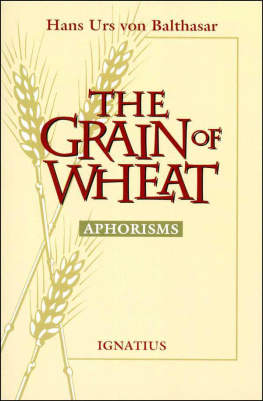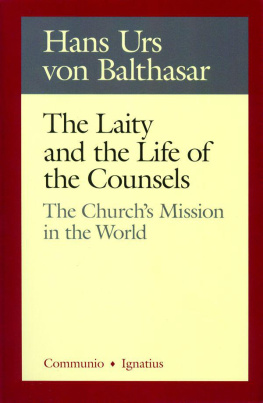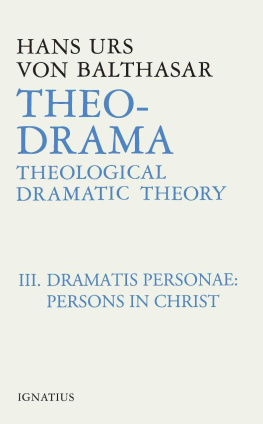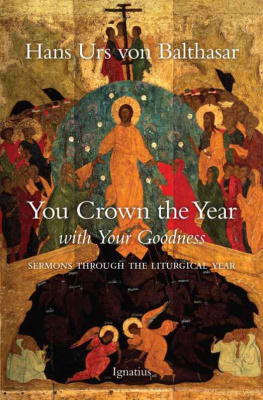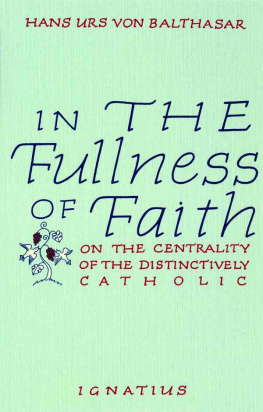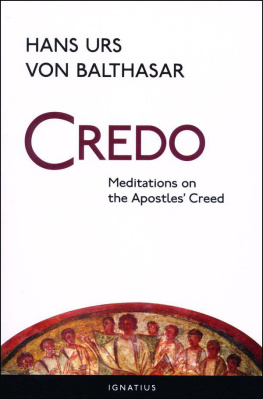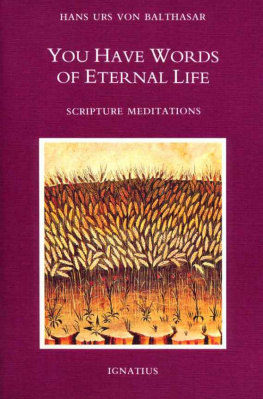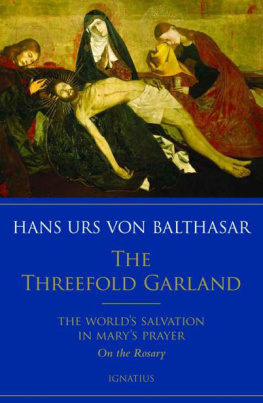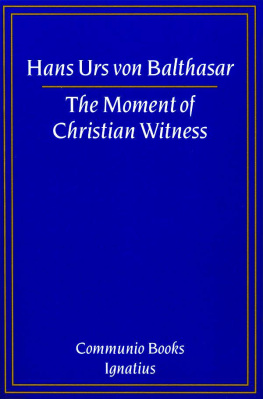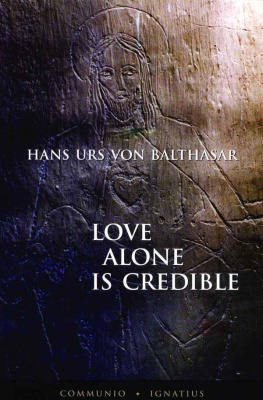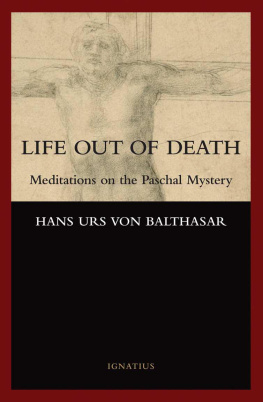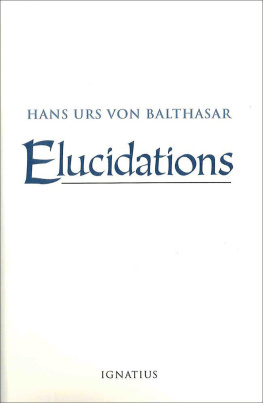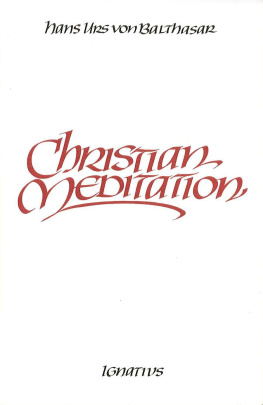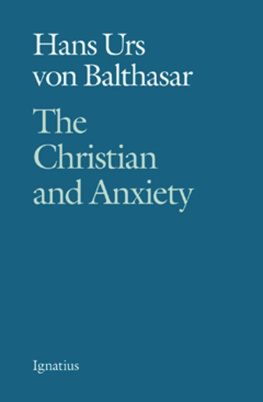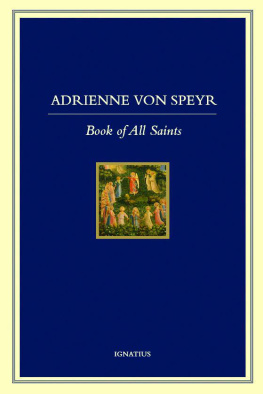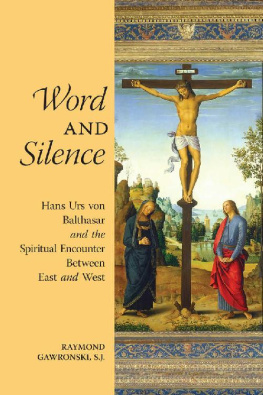THE GRAIN OF WHEAT: APHORISMS
HANS URS VON BALTHASAR
THE GRAIN OF WHEAT:
APHORISMS
Translated by Erasmo Leiva-Merikakis
IGNATIUS PRESS SAN FRANCISCO
Originally published under the title
Das Weizenkom
by Johannes Verlag, Einsiedeln
Johannes Verlag 1953
Cover by Riz Boncan Marselk
1995 Ignatius Press, San Francisco
All rights reserved
ISBN 978-089870-540-9
Library of Congress catalogue number 94-73064
Printed in the United States of America
Unless the grain of wheat falls into the ground and dies, it remains atone . Whoever wants to serve me must follow me .John 12
CONTENTS
TRANSLATORS PREFACE
Hans Urs von Balthasars stylealways lucid, always precisealways partakes of the poetic as well. Indeed, an essential aspect of his quest for precision is elegance of form and depth of treatment. These, along with the intensity of his contemplative vision, have always been the hallmark of von Balthasars writings. Since the author of these aphorisms saw fit to leave in the original texts borrowed from French writers, we have likewise decided to give the reader an occasional taste of Father von Balthasars German.
The form of the aphorism, which he selected for the present volume, adds an intimacy of tone and a concentration of thought that make it unique among his books. As a kind of distillation of nearly everything von Balthasar pursues at length in the rest of his uvre, this books first quality is that it is highly practical for the reader on account of its brevity. As well, it presents a sharp challenge to both translator and reader (the translator being nothing but a particularly active reader) on account of its density of meaning and frequent ellipsesexpressive leaps requiring vigorous collaboration with the authors thought at the levels of both language and life. These are texts, in other words, crying out for intimate, existential understanding and fulfillment.
The sovereign freedom of thought and the spiritual penetration these pages breathe should be an encouragement for readers of every tendency to move on beyond stale theological partisanship, to consider the fullness and dynamism of Christian truth in all its bright splendor.
To the merely conservative, for instance, von Balthasar says: Everything human remains suspended; nothing human ought to become entrenched and hardened. Just think of the relationship between lovers...; and: Atheism can be like salt for religion. It is negative theology posited in the most absolute way. Most of the time, psychologically speaking, atheism represents a disappointment with the narrowness and limitations of a certain concept of God....
To the merely liberal: The sense for rank and subordination is noble; the idea of individuals equality of value and rights is bourgeois; and: Whoever wants to become green quickly remains on the lower branches. The noblest sap will not be seduced into the lateral boughs: it rises vertically and pushes the crown of the tree higher.
And to all of us alike, who so often suffer from a despair based on terminal self-reliance: When we are exhaustedprecisely in the midst of this exhaustion, this failurewe experience that it is he who has come to us. Exhaustion as the rustling sound in which God is to be found (Elijah!); and: A God who was a mason and a carpenter for thirty years can surely make short work of the ruins of my soul.
The fifty years since the first edition of Das Weizenkorn (1944) and the forty-one years since the second edition (1953) have done nothing to rob these pages of their relevance, bite, and ability to nourish even as they challenge. In the end, every careful reader of Hans Urs von Balthasar will discover that the precious alchemy of his thought results from the deeply fruitful marriage he achieves between keen intelligence and ardent piety. This achievement, doubtless the very heart of the Christian intellectual endeavor, in itself exposes the fallacy of one of the dominant dogmas of our time: the necessary dichotomy between scientific fact and subjective faith. We must note, however, that the religious path this Catholic treads has nothing to do with official pieties and spiritual programs but rather bespeaks intensely human experience: The opposition of the dark tyrant within us [to divine union] is so powerful that this self must slowly be broken up to the last grain, like a rock under the continual attack of the waves. It must crumble away, rot, burn up, until the way is finally open. And the greatest opposition comes from spiritual aspirations.
The reader will surely grow in the conviction that, if von Balthasar proves to be one of the scant few thoroughly reliable teachers and pathfinders in the thicket of late-twentieth-century life, it is only because he himself exemplifies the truth of his own aphorism that only the one whose eyes can encompass much may be said to have an integrated vision.
Do not this great mans own life and work represent the Christian thinkers specific way of fulfilling the Lords parable concerning the dying and rising of the grain of wheat? Aphorism by aphorism, book by book, trilogy by trilogy, he has squandered himself like nourishing bread.
E.L.-M.
Chihuahua, Mexico
28 June 1994
Feast of St. Irenaeus of Lyons
GOD
Gods Face like a countenance beaming forth from the darkness: in order to see it we throw everything we possess into the firethe world, our joys, our hopes. The flame leaps forth, consumes it all, and in its glow the beloved Face lights up. But the flame dies down, and we feed it with what little remains to us: honor, success, our will, the intellect, our temperament, finally our very self: absume et suscipe take and receive. This is not simple self-giving but, increasingly, the knowledge that I am being taken, that I must surrender. Grace is everything: the moment of Gods appearing; grace also every sacrifice the fire snatches from me.
We cease to perceive water that continually flows, We hear our innermost wellspring, which flows forth from God, only when we make a conscious effort. This is why the saying of the Pythagoreans that the wise man perceives the music of the spheres is a truly religious saying. We should always be hearing, as with bodily ears, the gurgling wellspring of our origin in God.
We belong more to God than to ourselves; thus, we are also more in him than in ourselves. Ours is only the way leading to the eternal image of us that he bears within himself. This way is like a carpet rolled out from him to us, a scroll prodiens ex ore Altissimt coming forth from the mouth of the Most Highand we should, like children, learn how to copy it, how to trace the pre-scribed, pre-written characters that have been presented to us. The pre-scription, the law, is what Love has written out in advance, what Love pre-supposes and proposes to us that we might... become it.
The Life was the Light of men. An infinitely mysterious word: the Lifenot understanding or thoughtis the spuitual Light. The Life of the Logos, the divine Lifethe Holy Spirit, lux beatissima, lumen cordium the most blessed Light, the Light of hearts. This Light is the true Life of souls, unattainable by any psychology.
The bodily eye does not suffice to consider even a few of Gods works. It is not satisfied with the unique contemplation of even one thing. After looking at it intently for a long while it still cannot tear itself away. How much less, then, will the eye of the soul suffice, even when it is lucid and awake, to consider the wonders and judgments of God. BASIL
You will plunge most deeply into the foundation of existence if you consider delight to be the essence of your being. Hegels infinite superiority to Schopenhauer. Absolute being is absolute delight, and therefore trinitarian.
Was it not your bliss that you could never love as much as you have been loved? KIERKEGAARD
Next page
